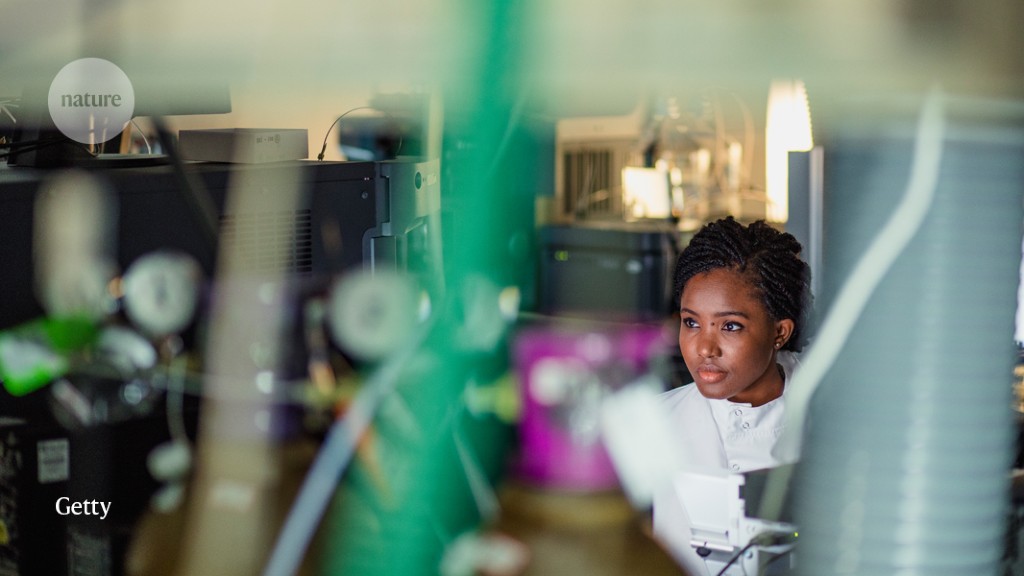Black people are seriously under-represented in UK academia. Of more than 21,000 professors across England, Scotland, Wales and Northern Ireland in 2018–19, just 0.7% identify as Black. There almost 10 times as many Asian professors as Black ones, and white people hold 83% of the positions, according to an analysis by the Higher Education Statistics Agency in Cheltenham.
In interviews with the UK University and College Union in 2019, 20 Black female faculty members described a persistent culture of bullying, stereotyping and microaggressions that undermined their sense of belonging in the academic sector. The lack of welcome has been underscored by low grant-success rates for people of colour.
But efforts are under way to create support networks for Black professionals in the UK science, technology, engineering and mathematics (STEM) workforce. One such initiative is BBSTEM (Black British professionals in STEM), a non-profit organization that aims to increase the representation of Black scientists in industry and in academia. Nature spoke to BBSTEM’s founder and two early-career scientists who have participated in its programmes and helped to develop others.
KAYISHA PAYNE: Helping young Black people to see themselves in STEM
Kayisha Payne is founder of BBSTEM and associate scientist in process engineering at AstraZeneca in Cambridge, UK.
I came up with the idea for BBSTEM in early 2017, while pursuing my master’s degree in chemical engineering at Imperial College London. My mother had found contact information for a Black professional in my field who could offer me career advice. We had a coffee, and I realized I was able to ask him questions without fear of intimidation. When he offered to support my career as a mentor, I thought about how our meeting was kind of an accident. I knew that I wanted to create a platform that would allow users to intentionally arrange those types of meeting — a platform through which Black students in the United Kingdom could see Black British adults in careers they want themselves.
I launched BBSTEM on 10 January 2018. I built the network by messaging professionals in science or engineering on LinkedIn and encouraging them to sign up with our database. I sought basic information — the university they went to, their scientific discipline, their profession, their years of experience and their willingness to be a mentor. We now have more than 300 professionals in our database across all scientific disciplines, although we’re heavily skewed towards industry. About 3% of those in the database are in academia.
We aim to increase those numbers, especially in academia, because basic research underpins so much of industry and we need to support that diverse pipeline. That said, every one of our roughly 30 grant applications to big UK funding bodies has been rejected. One reason might be that there is a lack of diversity on funding panels.
As a result, our team of five includes two employees and three volunteers — we all do this work on top of our full-time jobs. Our website has been live for more than two years, but only two people had clicked on our ‘donate’ button before this year’s first quarter, and one of those was a friend of mine. Following the protests that launched after the death of the unarmed African American man George Floyd at the hands of police on 25 May, we had a swell of donations: we are now at almost 200 donors, which has been helpful.
We partner with companies on job-shadowing and other programmes. For example, we teamed up with pharmaceutical company AstraZeneca to give more than 30 Black STEM undergraduate students a peek at one of the company’s research sites for a day. In June and July, we held a series of mental-health awareness workshops for graduate students of African or Caribbean heritage, supported by the UK Academy of Medical Sciences. This came at a crucial time — right in the middle of the Floyd protests. We’ve also launched a mentoring scheme to connect 22 established scientists with students. So far, about 300 students have taken part in our programmes.
Until this year, the programme has been kept going by blood, sweat and tears. In the past year, I’ve identified ways to diversify income for the organization. For example, companies pay BBSTEM to promote their job ads for industry or academia on our social-media channels.
More organizations — be they in academia, industry, government or the non-profit sector — need to put resources into their diversity and inclusion strategies. If they don’t have dedicated resources to tackle a problem, they are not going to get a dedicated outcome. What keeps me going is the feedback I get from young Black students who have taken part in our programmes. I’m doing something good here.
SIMONE WEBB: Network to fight the negative statistics
Simone Webb is a PhD student in immunology and bioinformatics at Newcastle University, UK.
In the United Kingdom, universities are predominantly white institutions by default; there is nothing like the historically Black colleges and universities that exist in the United States. I was one of two Black people in my undergraduate biological-sciences course at a Russell Group university (one of 24 leading UK research-focused academic institutions). There are estimates that there are only 25–40 Black female professors in the country. I’ve never been taught by one of them. It is so isolating; it is easy to feel like you don’t belong in these spaces.
Early in my PhD, I found BBSTEM online and joined its workspace on the messaging platform Slack. It was my first instance of immersing myself into an online Black professional community space. I also attended BBSTEM’s mental-health workshops, which helped me to think about how to manage loads of emotions and stress. BBSTEM provided access to a group of supportive Black colleagues, so I don’t always have to feel like I have to assimilate in white spaces. But I think the BBSTEM mentorship programme will be most valuable to me as I make important career decisions about whether to stay in academia while I finalize my PhD.
BBSTEM is also a broader home to several other networks. In 2019, Leading Routes, a group set up to widen access to academic careers for Black students, published its ‘Broken Pipeline’ report. It found that of almost 20,000 students funded by the seven UK Research and Innovation (UKRI) councils, just 1.2% were Black. The 30 of us who were Black Caribbean found each other on Twitter and formed the African-Caribbean Research Collective. We meet weekly. Networking opportunities are building. Another group, the West African Research Collective, also formed in the wake of the report.
Having these networks and mentorship links means that I can fight against the negative statistics and try to improve the numbers of Black female academics while having a supportive community. Without insights from senior colleagues who can detail what I am likely to face in academia, it would be difficult to make an informed decision about continuing in this sector. I have been concerned about whether racism, sexism and ableism (I have rheumatoid arthritis) could affect me in an academic career. But those might be broader workplace issues that I’d face anywhere.
CRAIG POKU: Cultivate intersectional communities
Craig Poku is a postdoc in atmospheric physics at the University of Leeds, UK.
I am the third Black British person to have received a PhD from the School of Earth and Environment at the University of Leeds in the past 20 years, out of recipients who declared their ethnicity. During my five years at the Institute for Climate and Atmospheric Science at Leeds, I have been the only Black British person doing a PhD or anything above that level. Atmospheric science is a very white field. I was told by a senior staff member at my secondary school that it was not a ‘Black person subject’. Ultimately, I received a bachelor’s degree in maths at King’s College London and pursued my interests in creating mathematical models of how the natural world worked, but it was quite lonely.
I am now part of the African-Caribbean Research Collective, which, alongside my BBSTEM membership, has allowed me to feel as if I don’t have to put on a front any more. I can just be myself. I identify as queer as well as Black British, and it can be exhausting to have to hide aspects of your character because of the fear that people will judge you and not your research. Early on, I avoided being too ‘loud’ and wore relatively conservative clothing. That’s not the case any more.
I’ve helped to merge some of these networks. In July, I and two others spoke about our experiences being Black and queer in science at a Black LGBTQ+ in STEM Virtual Networking event, which stemmed from a collaboration between BBSTEM and Pride in STEM, a charity founded in 2016 to support scientists from sexual and gender minorities.
I want my research to contribute to society. In my postdoc, I focus on how air quality can improve fog forecasts in northern India. But I’ve also become interested in science communication, in part because I can help encourage Black British kids to consider the sciences as a career.
I helped to coordinate an international project in mid-September called Black in Geoscience week, in which Black geoscientists around the world shared their research and backgrounds on social media. We are analysing the data now, but it looks as if up to 120,000 people interacted with the content that we collectively created. And our tweets reached at least six million people.
We are now planning events to bring BBSTEM and the UK side of Black in Geoscience together. I hope that universities will take advantage of BBSTEM’s expertise to improve diversity in their own departments.




